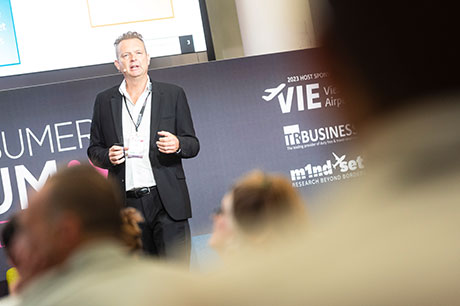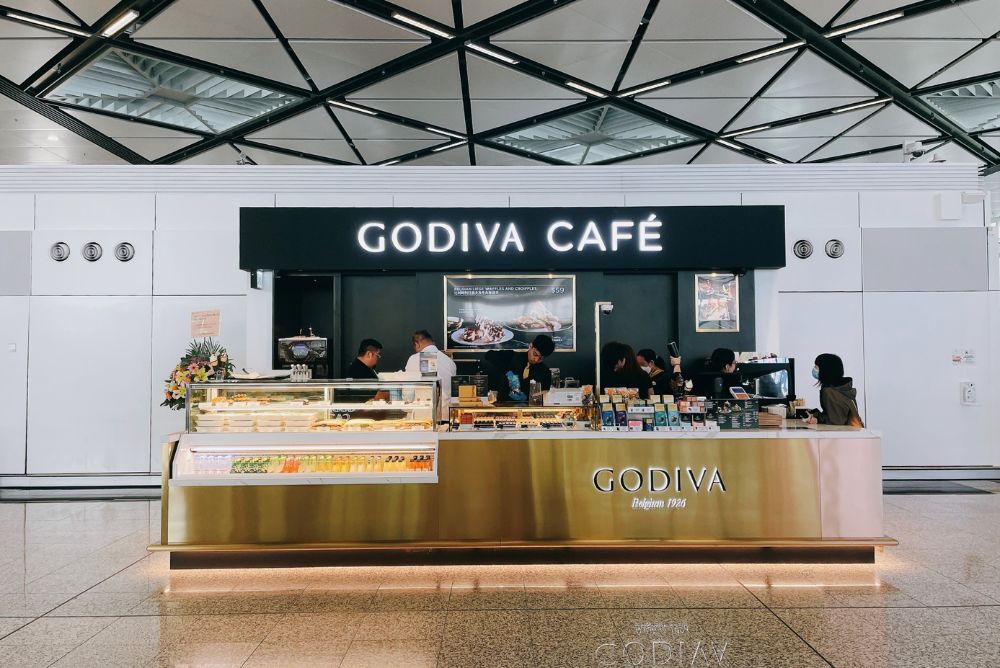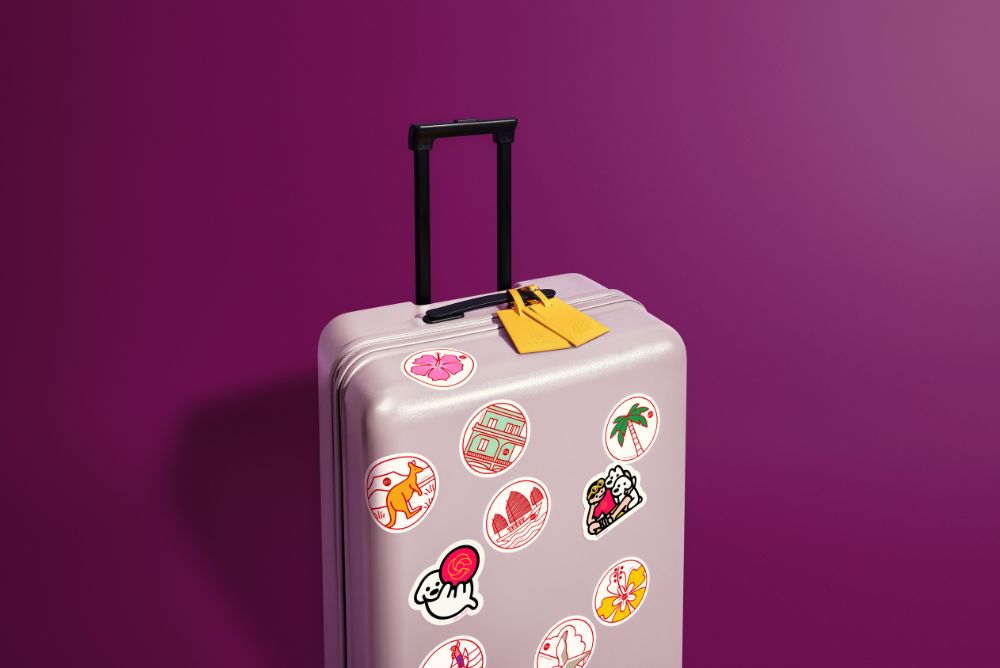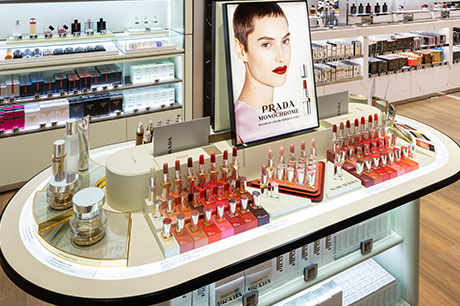Conversion battle ‘not won’, says ARI’s Hernan
By Luke Barras-hill |
 Global travel retail’s ability to translate what had been healthy passenger traffic levels over the years into revenue-generating opportunities has been called into question once again.
Global travel retail’s ability to translate what had been healthy passenger traffic levels over the years into revenue-generating opportunities has been called into question once again.
In a wide-ranging and candid interview, Aer Rianta International (ARI) Chief Executive Ray Hernan told TRBusiness that the conversion issue needs to be addressed moving forward.
“As an industry, we have not won the battle in recent years in terms of converting passenger volumes into strong underlying sales growth,” he explained.
“We probably took the eye off the ball given that the Chinese customer became so important for us all. It kind of hid the underlying weakness in terms of conversion per passenger. We need to reassess that, and it is a huge focus for us now.
“Some of the scary statistics we’ve been hearing is more people rather than fewer people think we don’t offer value in the airport environment. That means our communication is bad. We need to improve that.”

Ray Hernan, Chief Executive Officer, Aer Rianta International:”We have reacted well to changing consumer behaviour. We’ve had to make some very hard decisions and we made them very early. Our smaller teams have had to learn how to be more efficient and we’ve focused on what we can control.”
TIGHT REIN ON COSTS AND CASH BURN
Undoubtedly, 2020 was the year that delivered the knock-out blow to passenger volumes and bottom lines as Covid-19 wreaked havoc across travel retail’s lifeblood aviation and maritime industries, among others.
Airports suffered extraordinary traffic plunges, in some cases month-on-month vagaries of more than -90%.
The causal affect on operations was no different for multi-location travel retailer ARI. The company boasts operations in 12 countries and, in addition to managing its own outlets at Dublin and Cork Airports, has retail interests in a further 11 countries. ARI also holds parent daa’s shareholding in Düsseldorf and Hermes Airports.
“It has been without doubt the worst financial year we’ve experienced in our history,” opened Hernan, who made clear that the priorities were first and foremost avoiding cash-burn and protecting the business.
Without mentioning specific figures, Hernan confirmed that revenue was materially down.
“I do see the very tight management of cost and cash is going to be with us for a considerable period of time,” he observed.
The fact that ARI is in the fortunate position of not being highly geared as a business proved advantageous to its balance sheet at the end of the year.
Despite the significant operational pressures as a result of Covid-19, Hernan said ARI ended up performing better than pax volumes for the year.
“This is a reflection of our team in terms of what they did to increase penetration for passengers,” he continued. “Aligned with that was the support of brands and we got a very good value offer out there. Also, we worked very closely with airports.
“Fundamentally – irrespective of the product offer, exclusives etc – unless we had the passenger comfortable in the environment, we would never have converted passengers into customers and sales.
“We have reacted well during the year to changing consumer behaviour. We’ve had to make some very hard decisions and we made them very early. Our smaller teams have had to learn how to be more efficient and we’ve focused on what we can control.
“It’s very hard to influence pax volumes through the airports, but what we have influenced and tried to manage when passengers get to the airport is making them comfortable and the experience as normal as it was pre-Covid.”

ARI has extended its concession agreement with Montréal–Pierre Elliott Trudeau International Airport.
TEAMS REACT AND REASSURE
The ARI chief singled out the dedication of ARI’s teams in complying with health and safety protocols. This, together with allaying hygiene concerns from travellers, proved a fruitful strategy as passengers lifted their dwell time in the shops.
“Overall in our business, we’ve seen a much better penetration rate and that has converted into improved spends in a lot of instances,” he said. “There are learnings in terms of how we react moving forward. Safety I think will be a key issue for a long time.”
The introduction of the vaccines rollout across many parts of the world breeds optimism that confidence in international travel and spending will revive in time. Notwithstanding this, the curve of that trajectory is generally acknowledged to be rooted in hypotheticals.
According to a forecast from ACI World based on the bulk of global vaccines deploying in 2021, global passenger traffic levels are tipped to return to 2019 levels by 2023. However, mature international markets are expected to recover more slowly.
In the meantime, travel retailers face critical issues around inventory, ordering, customer payments and ultimately fulfilment.
“We’ve all had to clear mountains of stock this year and have been successful in doing that,” commented Hernan. “Now it’s about how we get smarter and manage stocks on an ongoing basis, working with suppliers in ways to shorten the lead times.
“It’s about how we leverage technology, not just about more social media – although that is important. We’ve got a greater focus now on value for money, what is working and not working, and making decisions quicker. We’ll be faster to adapt as new technologies emerge.”
While aforementioned passenger traffic levels are the so-called ‘non-controllables’ in the current climate, the ‘controllables’ for Hernan’s ARI include aligning its customer proposition much more closely to demand.
“Having dealt with the immediate burning platform, it’s now about realigning our proposition,” he continued. “We had customer research groups, but they didn’t achieve a lot during the year as people were so focused on, and blinkered by, safety.

While technology is an important enabler, the ‘human’ dynamics of retailing remains firmly at the heart of ARI. Ensuring customers are comfortable in the airport environment has underpinned the company’s approach since the Covid-19 pandemic hit and that strategy has been core to increasing penetration and ultimately, sales.
“They weren’t really thinking about the product offer or type of environment they would be in. We pulled together a cross-functional group across our operation, thinking about the operations with no financial impediments or barriers.
“Less people are buying, that is the opportunity for us to control: How do we convert more passengers? We have come up with a proposition we will be rolling out this year. We will have to track consumer behaviours more than ever before.”
While acknowledging technology as an enabler, Hernan is adamant that the ‘human’ dynamics of retailing will continue to burn brightly for ARI in the months and years ahead.
As such, training and development and the evolution of frontline staff engagement with customers will remain essential.
These elements sharpen in the context of a competitive and steadily consolidating retailer landscape, particularly in Asia Pacific, with companies pre-pandemic vying for new [and increasingly expensive] contracts.
Indeed, ARI has been busy of late in launching and confirming concessions either directly or via joint ventures and partnerships. The Dublin-based travel retailer has become particularly renowned in developing joint ventures and partnerships over the years, notably in the Middle East.
EXTENSION AT MONTRÉAL AIRPORT
ARI announced in October a five-year duty free and travel retail concession covering Montenegro’s Tivat and Podgorica Airports.
Trading as Montenegro Duty Free, ARI will serve passengers from a 122sq m duty free shop at Podgorica Airport in the country’s capital city and a 98.5sq m store at Tivat Airport when the leases begin later this year.
TRBusiness broke news of the development in 2019 before the contract was formalised last year.
Separately, ARI’s parent daa revealed in January that subsidiary daa International had won the contract to operate airfield and terminal operations at the new Red Sea International Airport in Saudi Arabia.
Later that month, as extensively reported, ARI partner Bahrain Duty Free unveiled its new duty free and speciality retail concessions at Bahrain International Airport.

Post-Brexit lift: A liquor area at Larnaca International Airport in Cyprus. Although it remains early days given the low pax volumes, there are early indications that the liquor category as a percentage of total sales has increased on routes between Cyprus and the UK following the restoration of duty free between the UK and EU.
Aer Rianta International Middle East (ARIME) holds a technical service agreement with Bahrain Duty Free and this was recently extended for another 10 years.
The sprawling concessions cover more than 4,500sq m of space and feature a number of luxury boutiques in the mix.
“The Middle East seems to be getting on top of vaccinations and getting used to the new ‘normal’,” noted Hernan. “Certainly, our sales performance in the region seems to be outdoing our other locations, which is good to see.”
In terms of new business, Hernan nods in anticipation around the launch of new tenders in the future with ARI actively engaged in discussions to that end.
The hard work undertaken by Gerry Crawford, who departed the business last year, and his team means ARI is in a strong position to capitalise on new pipeline approaches, particularly with regards to joint-venture set-ups.
“I’d be hopeful we will get some of those [negotiations] over the line in the current year, given that there is still a lot uncertainty out there and timelines for tenders coming to market have been delayed in a lot of instances,” said Hernan.
“We spent a huge amount of time last year renegotiating contracts; a lot of that has been done. We’ve renegotiated and extended in instances where it was important to do so.”
On the topic of contract extensions, Hernan reveals that ARI has lengthened its concession agreement at Montréal–Pierre Elliott Trudeau Airport [TRBusiness aims to bring you further details of the deal in due course].
“We’ve agreed an extension and revised terms, which we’re very happy with and I am pleased that we’ve reaffirmed our commitment to Montreal Airports,” said Hernan, although he stopped short of providing further details on the contract tenure and terms. “It is a sign of our strong relationship with them,” he added.

A selection of luxury boutiques, part of Bahrain Duty Free’s sprawling new duty free and speciality retail offer that inaugurated in January.
Returning to the Middle East, debate around when Abu Dhabi’s Midfield Terminal Building (MTB) will open continues to rumble on. TRBusiness learned from a well-placed source towards the end of 2020 that the MTB would not open until 2021 at the earliest.
ARIME was awarded a 10-year perfumes, cosmetics, skincare, sunglasses and jewellery contract by Abu Dhabi Airports Company in 2015 but the terminal opening has suffered consecutive delays.
As a result, it is understood that the commercial contracts have been renegotiated. Unsurprisingly, Hernan is keen to see the concession begin trading.
“The team in the Middle East and in Dublin have worked extremely hard to try to deal with the uncertainty and realignment of time lines on many occasions. I sincerely hope we open in Abu Dhabi this year.”
Asked about the current situation and how continued uncertainty affects the terms of the contract moving forward, Hernan replied: “We do have a minimum time line in our contract to be informed of an opening date. It’s not just us that is impacted, but trying to manage our brand partners in terms of shop fits, designs etc.
“It’s in everyone’s interest to get it opened sooner rather than later. It will be an amazing location, spectacular store and an absolute shop window for us.”
CONCESSION MODEL: A CHANGE IN MIND SET
The ordinarily passionate discussion around the plausibility of the traditional airport concession model has gained added noise during the pandemic, as landlords, retailers and brands grapple with the Covid-19 financial fallout against the backdrop of frequently demanding contract agreements.
“As an industry we are all shouting to say that the balance of financial risk has swung very much towards the retailer,” commented Hernan. “Proof as to how broken that model is has come to pass in the past 12 months: it does have to be reassessed.
“I am relieved that there was an acknowledgement by the vast majority of our landlords that applying the rigour of a legal contract was folly in the current environment. There was a lot of pragmatism in the approach. I would say we’ve reached satisfactory arrangements with the vast majority of our airports.
“I do expect – and we have experienced now – that there is much more openness to looking at alternative business models. Partnerships and joint ventures, the backbone of our business, is being spoken about a lot more.
“We are certainly getting more approaches about entering into longer term arrangements with potential partners i.e new airports. We could see contract lengths increasing, but it’s against the backdrop of a partnership/JV model.”

The team at Dublin Airport, pictured here celebrating the re-opening of The Loop Duty Free store in June 2020. ARI says its marketing campaigns have become more engaging, supported by greater clarity of messaging around product value.
Interestingly, Hernan suggests that in many instances the conventional MAG structure may have pushed retailers towards sticking with staple brand offers to satisfy margin levels, and ultimately concession fees.
However, he notes that bids angled towards longer-term, more sustainable profit set-ups have been a characteristic feature of the past 12-24 months.
“Now, it’s about picking the product and probably turning brands to be aligned with the changing behaviour of the consumer,” he explained.
“The one thing we’ve learned in recent years is consumer loyalty to brands is less and airport retailers have been slow to adapt to that, but they’ve probably felt they were hamstrung [by margin requirements].”
During the course of discussion, attention turned to Brexit-generated opportunities sparked by the restoration of duty free liquor and tobacco sales between the UK and EU. This is undoubtedly beneficial for ARI’s Ireland and Cyprus operations, the latter of which has historically benefitted from a large contingent of UK-based travellers.
Should EU legislators unlock the door to duty and tax free shops on arrival, the subject of fervent discussion of late, it would offer a potentially huge fillip for EU airports.
An independent report released last year from York Aviation commissioned by the European Travel Retail Confederation (ETRC) estimates that arrivals duty and tax free sales could make up 20-30% of total travel retail sales at EU airports (with the more likely figure at the bottom of the range).

Aside from ‘levelling up’ existing competition between EU and non-EU airports, duty free and tax free sales on arrival at EU airports would offer customers a sustainable choice: Purchase goods to carry onboard, or buy at their destination.
The lobby has been vocalising the important of ‘levelling up’ competition between EU airports and their counterparts, though current EU legislation would need to change as currently only departing passengers from the bloc are permitted to avail themselves of tax and duty free purchases.
“It gives the customer another chance to buy and it’s good from a sustainability perspective as it gives that discerning customer the choice of whether they carry onboard or buy at their destination,” commented Hernan.
Echoing the message around ‘levelling the playing field’ for EU airports versus their non-EU counterparts, Hernan concluded: “I think non-aeronautical revenues are going to become more and more important for airports moving forward. I see arrivals shopping as a mechanism to support airports indirectly via another income stream.”
Main image source: daa.
Alcohol insights: Conversion up, spend down in Q4
Conversion of visitors in the alcohol category in duty free has risen to 54% in Q4 2023,...
Heinemann Asia Pacific makes breakthrough in New Zealand at AKL
Heinemann Asia Pacific is set to enter the New Zealand market with three new retail concepts at...
Men buy and spend more in travel retail says new research by m1nd-set
Men have a higher conversion rate and spend more when shopping in travel retail, says new...
-
 International,
International,Alcohol insights: Conversion up, spend down in Q4
-

-


In the Magazine
TRBusiness Magazine is free to access. Read the latest issue now.

 Trbusiness. The travel retail Trbusiness. The magazine for global retail and duty free professionals.
Trbusiness. The travel retail Trbusiness. The magazine for global retail and duty free professionals.





















